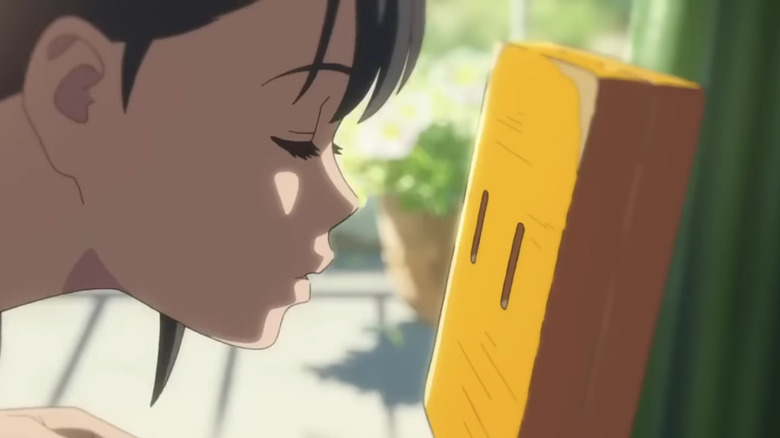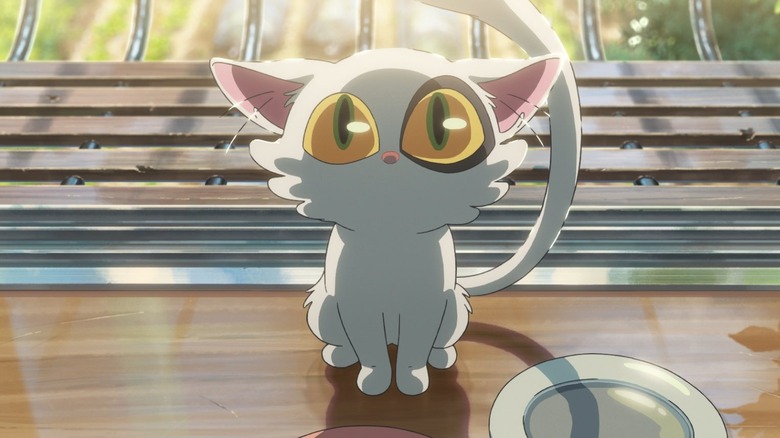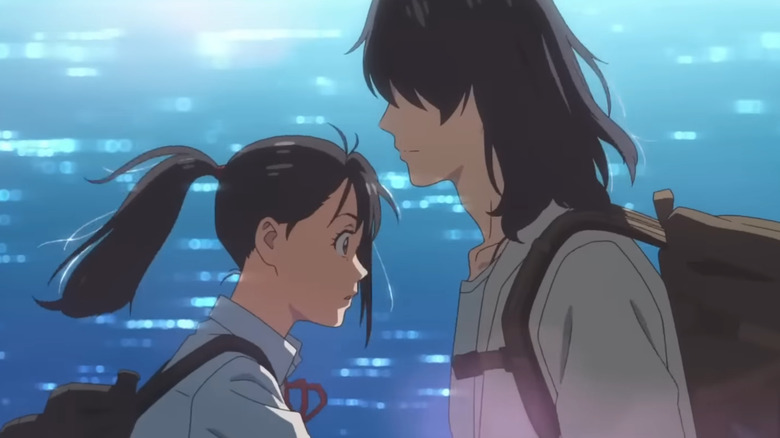Suzume Review: Pull Up A Chair To This Entrancing Adventure
- As beautifully animated as expected from Shinkai
- Takes big unpredictable swings
- Comes together as moving in the end
- Takes a while to get to the point
- Some weirder turns may be hard to roll with
Makoto Shinkai is one of those directors who's been accused of making the same film over and over again — an assessment that's not entirely unjustified but ignores the fascinating ways his approach has evolved over the years. He broke into the anime scene with 2002's "Voices of a Distant Star," a heartbreaking short film about lovers separated by the vastness of space and time that the director animated entirely on his home computer. He followed this cult success with more increasingly ambitious but undeniably repetitive movies and shorts about lovers separated by big obstacles.
Then came 2016's "Your Name," a movie that fit the standard Shinkai story and style formula but elevated the material to a point where it became, for a time, the highest-grossing anime film ever at the global box office. "Your Name" broke out into the mainstream where past Shinkai anime failed due to stronger characters, a sense of humor, and a story that resonated with Japan, which was still processing the 2011 Tohoku earthquake and tsunami and Fukushima nuclear disaster at the time. Themes of dealing with disaster carried over into Shinkai's 2019 darker follow-up film "Weathering With You," which delivered a questionable metaphor for climate change.
With Shinkai's new feature "Suzume" (titled "Suzume no Tojimari" in Japan), the director's focus on the disaster has overtaken the starcrossed lovers' narrative almost entirely. Yes, the climax still involves one character rescuing their crush from another dimension, but the romance is among the most minor of the various genres and tones the film balances. It's at least as much a comedy, a horror movie, a surreal fantasy, a coming-of-age family drama, and a reckoning with recent history. Everything Shinkai has previously dealt with through the lens of metaphor ends up being approached shockingly directly.
The closest Makoto Shinkai has come to Miyazaki
As happens with every anime director to earn any critical or commercial success whatsoever, people have called Shinkai "the next Miyazaki," but that generally hasn't been the aptest comparison. The two filmmakers have very different styles and interests, and the last time Shinkai directly tried to make a movie in Hayao Miyazaki's style, "Children Who Chase Lost Voices," it was the worst of his career. "Suzume" has its own very un-Miyazaki-like elements (I can't imagine a Ghibli film with McDonald's product placement), but it feels like Shinkai's new attempt at injecting more Ghibli-esque elements into his regular style. The results this time around are much more successful at capturing the feel of a Ghibli film than "Children Who Chase Lost Voices."
"Suzume" is a road-trip movie, in which the teen girl title character (voiced by Nanoka Hara in Japanese) travels alongside "Closer" Souta Munakata (Hokuto Matsumura) across Japan to lock doors and stop monster worms from causing natural disasters. If the choice to start her journey off in Miyazaki prefecture doesn't necessarily count as a knowing Ghibli reference, then name-dropping "Whisper of the Heart" in reference to the magical cat antagonist Daijin (Ann Yamane) sure is. A sequence working at a bathhouse plays as a "Spirited Away" homage, while Souta's human character design recalls Howl from "Howl's Moving Castle" and the worms' fluid red hides evoke the cursed gods in "Princess Mononoke." Like a Ghibli film, "Suzume" has a story that operates on dream logic, creatures both cute and grotesque, ambiguous morality, and wild transformations.
About those transformations: Yes, Souta spends the majority of the movie transformed into a chair; yes, it's exactly as silly as it sounds; and yes, they do somehow try to connect the chair stuff to the more dramatic plotlines in ways I'm not sure entirely work. But this ridiculous turn does work as a chance for Shinkai to demonstrate his underrated skills as a director of comedy. The animation of chair-Souta wobbling his way around the streets while trying to hide from baffled onlookers is inherently amusing, and a sequence where he has to deal with two rambunctious children is so funny it made me want Shinkai to try a straight-ahead comedy in the future. (Also, yes, the chair form makes all the hints of romance extremely funny, though thankfully this is both intentional and a small part of the big rambling story.)
Building a fantasy around a real tragedy
"Suzume" is an extremely busy film, and it takes a while for its real thematic thrust to come into focus. Once it becomes clear, however, it proves to be perhaps Shinkai's most powerful meditation on grief, hope, family, and perseverance. Given the way these themes are handled in a series of reveals that range from heavily foreshadowed to genuinely jolting, it's hard to go into too much detail in a spoiler-free review, but I can say that the film's wacky fantasy mythology has been built around real history, serving a function now not dissimilar to the cathartic release that the original "Godzilla" must have been in 1954.
From the opening scene, Suzume has dreams about a mother who's no longer with her. She lives with her aunt Tamaki (Eri Fukatsu), who ends up being one of the more fascinating characters. As Suzume journeys further and further from home, Tamaki follows her while trying to find out what her niece is doing and if she's safe. The eventual confrontation between the child and caretaker hits such a raw nerve that it feels like the film is just inches away from turning into "The Babadook," though the story goes in other directions from there.
Where the story eventually ends up is a natural progression from "Your Name" and "Weathering With You" as a thematic trilogy of sorts. Where "Your Name" was a fantasy of averting disaster and "Weathering With You" romantically embraced fatalism, "Suzume" finds the director finally able, after a series of weird and entertaining digressions, to finally articulate both the pain of living in the aftermath of tragedy and the joy of going on with life anyway.
"Suzume" opens in theaters on April 14.


